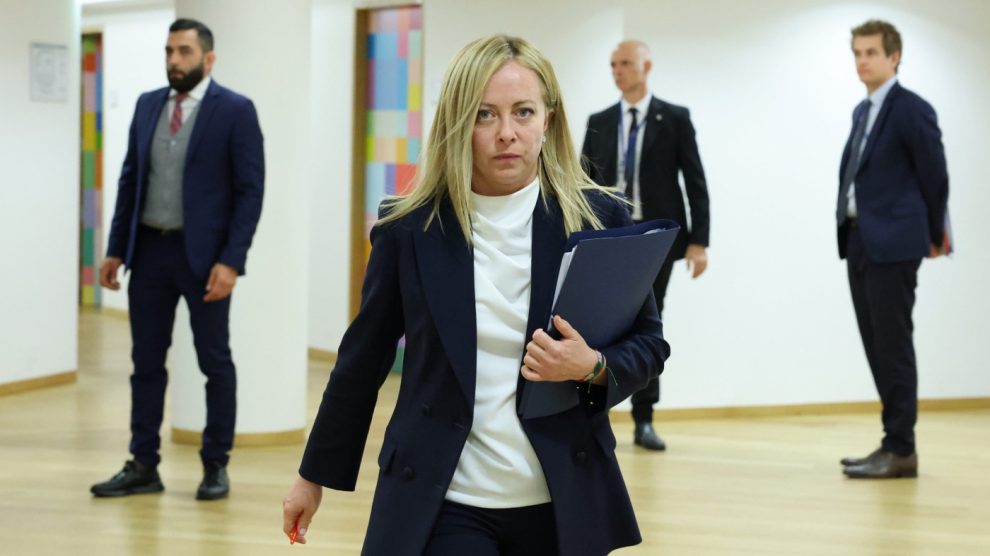It’s showtime in the Italian Parliament. After hitting the Senate on Tuesday, Prime Minister Giorgia Meloni appeared in the Lower Chamber on Wednesday to lay out the positions she would be carrying to Thursday and Friday’s European Council meeting in Brussels. We distilled them in a cheat sheet.
- The Italian voice in Europe, she assured MPs, “is and will always be strong.”
Supporting Ukraine. That’s among the top dossiers, especially in the wake of Chinese President Xi Jinping’s visit to Moscow and show of support to Vladimir Putin. The PM promised the government would continue standing by Kyiv “regardless of the impact” the choice might have on her majority’s consensus.
- She dismissed theories about Rome favouring a military escalation by supplying weapons as “propaganda,” noting the air defence systems Italy is supplying are needed to “protect the lives of civilians.”
- She also rejected the idea that Rome could decrease taxes or increase pensions by stopping its weapons supply to Kyiv. Military aid, she argued, serves to “keep the war away from the rest of Europe and our home.”
- Finally, she added her government does not conceal its intention to increase military allocations. In fact, she stressed, it intends to own the commitment because “freedom has a price.”
- Although the governing majority supported her, two parties aired their usual grievances.
Migration. The government has been under fire from opposition parties over what they claim was its mishandling of the deadly shipwreck that claimed the lives of over 80 migrants off the coast of Calabria. After reaffirming the State “couldn’t have done more” and that she had “a clear conscience,” she stressed that Europe must do more to address the “emergency that is becoming structural.”
- “We have been left alone to do this work, sometimes outside our national borders,” said PM Meloni in Parliament, highlighting her government is working to promote “a European mission to block departures in collaboration with African authorities [along with] cooperation that brings development.”
- The only way to prevent tragedies like the recent one, she stressed, is “to stop illegal departures, which is what the government is trying to do.”
- Italy’s migrant hotspots are over capacity, she added, and it’s increasingly hard to prevent migrants from travelling to other nations. “We are not willing to accept that Italy is the refugee camp of Europe,” she concluded.
- At the last EU ministerial meeting, Interior Minister Matteo Piantedosi laid out Italy’s “third way” solution for European migration management: associating repatriations with reintegration projects and investments in the countries of origin and a more vigorous and EU-centralised approach to border operations.
Energy and the transition. In her communiqué to Parliament, the PM took pains to highlight the risk of increasing the already-consistent dependence on Chinese equipment as Europe accelerates its decarbonising efforts. “After what the Russian aggression against Ukraine has taught us, there is a risk of moving from dependence on Russian gas to dependence on Chinese electricity: I don’t think this is smart; I think Europe should work on its technological sovereignty.”
- On the subject of electric vehicles – the flashpoint of an ongoing debate in the EU that saw Italy siding with Germany and others to protect the internal combustion engine and the related industry – the Italian PM reiterated that Rome would only accept a strategy that envisioned biofuels as well as e-fuels.
- The previous European agreement would have effectively forced an industry switch to electric vehicles.
- Italy’s bedrock, as expressed by PM Meloni, is the principle of technological neutrality. “Europe can set the targets, but not tell [us] how to reach them,” she stressed, referring to the engine issue and the proposed EU targets on the buildings’ energy efficiency, which the government believes does not take into proper account the peculiarities and needs of Italian houses.
Fiscal stability. The Italian PM noted Rome is not giving in on the European negotiations to reshape the bloc’s fiscal rules. “The time for austerity is over,” she warned, clarifying that the dealmaking is accompanied by “flexibility on the use of funds,” including EU-bankrolled money.
- Italy is the last EU country that is still to ratify the European Stability Mechanism reform. PM Meloni, which has long been warning against the strings that come with using this emergency fund, assured Parliament the government would ratify the reform but that as long as she’s in charge, Italy wouldn’t be taking advantage of the ESM.





